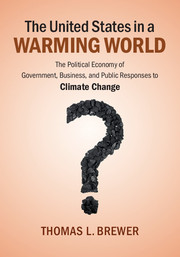 The United States in a Warming World
The United States in a Warming World Book contents
- Frontmatter
- Dedication
- Contents
- List of boxes
- List of figures
- List of tables
- List of maps
- Preface
- Acknowledgments
- Permissions
- Introduction: a chronological overview
- Part I Issues
- Part II Domestic economics and politics
- Chapter 2 Business: part of the problem and part of the solution
- Chapter 3 Public perceptions and preferences
- Chapter 4 State and local governments – and the courts – in a federal system
- Part III National government policies
- Part IV The future
- References
- Index
Chapter 2 - Business: part of the problem and part of the solution
Published online by Cambridge University Press: 05 October 2014
- Frontmatter
- Dedication
- Contents
- List of boxes
- List of figures
- List of tables
- List of maps
- Preface
- Acknowledgments
- Permissions
- Introduction: a chronological overview
- Part I Issues
- Part II Domestic economics and politics
- Chapter 2 Business: part of the problem and part of the solution
- Chapter 3 Public perceptions and preferences
- Chapter 4 State and local governments – and the courts – in a federal system
- Part III National government policies
- Part IV The future
- References
- Index
Summary
We’re the third-largest emitter of CO2 among corporations in America because we generate 70 percent of our electricity at 20 coal-fired power plants. Of all the companies in the world, we’re the 12th-largest emitter of CO2. I share these numbers with you not to brag, but to give you a sense of my special responsibility, the daunting job in front of me.
James E. Rogers, CEO of Duke Energy (2010)There needs to be a price for carbon, then the market will decide which technology wins.
Jeffrey Immelt, CEO of GE (2005)This chapter addresses questions about business responses to climate change at several levels: firms, industries, and national and international business associations. It focuses on the economic interests of business, including how interests vary among industries and among firms within industries, and how firms’ and associations’ positions have changed over time.
There have been important splits within “the business community” in what to do about climate change. These splits have sometimes been publicly observable as long-established business associations and ad hoc alliances of firms have splintered over positions on specific pieces of legislation. In addition, while some firms have participated in partnerships with environmental organizations, others have eschewed such arrangements. The themes of variations in firms’ interests vis-`a-vis climate change and how those variations have affected firms’ business practices and political activities are developed by addressing a series of questions: In Section 2.1, which emphasizes diversity in firms’ interests, the key question is: What firms and industries are the leaders and laggards in responding to climate change issues – and why? Who are the winners and losers from climate change policies? In Section 2.2 the insurance industry receives special attention because of its importance as an industry that is directly affected by climate-related loses and as a major investor in many sectors of the economy.
- Type
- Chapter
- Information
- The United States in a Warming WorldThe Political Economy of Government, Business, and Public Responses to Climate Change, pp. 53 - 82Publisher: Cambridge University PressPrint publication year: 2014


